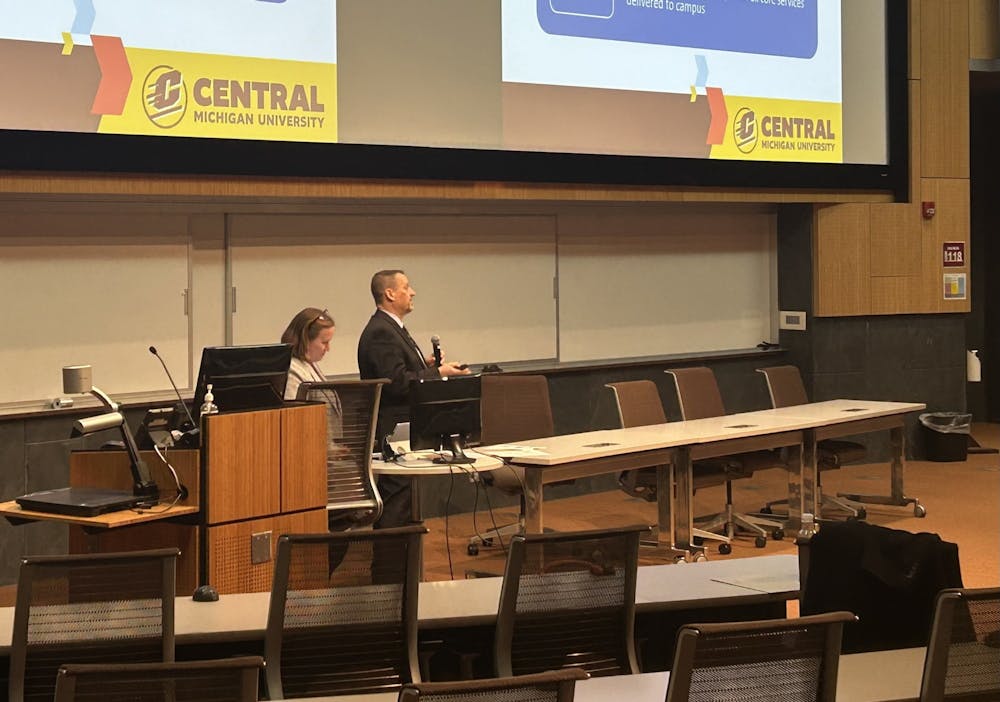Academic Senate hears update from OIT, eliminates some graduate certificates

During Tuesday’s Academic Senate meeting, senators heard updates from the Office of Information Technology, the president and provost’s report and voted on curricular changes.
Updates from OIT
Jim Bujaki is the vice president of information technology at Central Michigan University, and came into the academic senate meeting to provide an update on OIT’s finances and operations.
He started by explaining two areas where the current funding model leaves gaps. The first is the telecom chargeback system.
The cell phone plan on campus at CMU was written 20 years ago, and no longer represents the technology we’re using, Bujaki said.
He listed three solutions to what he called the “outdated system.”
- “Increase transparency of costs and services provided,
- “Minimize chargebacks whenever possible and
- “Bundle and include foundational OIT Core Infrastructure services as part of all core services delivered to campus.”
“We’ve been working with the financial planning and budget group as part of their reimagining the CMU budget and accounting for those services,” Bujaki said.
The second funding model gap, replacing capital equipment, has already been addressed financially, but not long term.
Bujaki said that for the fiscal year 2022-23, OIT received $1.15 million in supplemental funding to replace equipment. OIT’s request for 2023-24 was also filled with $13.15 million in one time funding.
“We are working with the office of financial planning and budgets as they work towards re-imagining the CMU budget model to ensure a budget model which includes a funded IT capital equipment replacement plan moving forward,” Bujaki said.
He added that these replacement funds may not have visible effects for students, but will impact the technology they work with. Bujaki listed specifically the technology systems in the registrar’s office and in financial aid, and said the funding would also support wireless infrastructure in places like residence halls.
“It’s all the back end infrastructure students interact with,” Bujaki said.
He compared CMU to other universities in the state based on whether their budgets include funding for capital equipment replacement.
“We’re definitely in the minority in just being (funded) happenstance,” Bujaki said.
Another issue that Bujaki explained was employee turnover.
He said that after the pandemic forced OIT’s offices to adapt and provide hybrid and online positions, there’s significantly more employee departures. While their offices are now capable of employing people in online positions across the country, Bujaki said that they’re still only capable of paying the rate of a typical mid-Michigan IT worker.
And that rate is less than other regions in the US, Bujaki said. But Human Resources, instead of OIT, has control over their pay scale.
“They (human resources) have a philosophy that’s applied to other units that doesn’t give flexibility for changes to the pay scale,” Bujaki said.
If they want to offer individuals more money, he said, their office has to make specific requests.
A graphic in Bujaki’s presentation listed the reasons for employees leaving their jobs at OIT, and the top two– compensation and remote work– make up 58% of the total reasoning.
To counter the problem of staff retention, Bujaki said the department would be reviewing IT compensation comparison benchmark data and focus on employee satisfaction and culture.
President and provost’s report
During her joint report with the president, Provost Nancy Mathews gave an update on the strategic planning listening sessions.
“Thank you for participating in the sessions for strategic planning,” Mathews said. “We are up to about 30,000 words (and) 60 pages of comments. I’m hearing a ton of great ideas.”
The last three listening sessions are available virtually on Wednesday, March 22. The links to these sessions are on the strategic planning website, and as well as the links to feedback forms for those unable to attend the sessions.
The sessions are 9-10 a.m., 12-1 p.m. and 3-4 p.m., and are open to all students, faculty and staff.
During the report, President Bob Davies shared some statistics about enrollment and registration for the fall 2023 semester.
According to Davies and Mathews’ report:
- Deposits are up over last year by 15%
- Orientation reservations are up 34%
- Housing contracts are up 21.6%
“We are seeing some great results with freshmen, transfer (and) international students, graduate students and everyone in between,” Davies said.
Curricular changes
The senate approved a series of program deletions during the meeting on Tuesday. These included the following:
- Public affairs minor
- Graduate certificate in citizen engagement
- Graduate certificate in European history
- Graduate certificate in modern history
- Graduate certificate in U.S. history
The senate also voted to change the title of the broadcast and cinematic arts major, usually referred to as a BCA, to an MCA or Media and cinematic arts degree.
The Academic Senate meets bi-weekly on Tuesdays from 3:30 to 5 p.m. in the French Auditorium. Livestreams and recordings of each meeting are available on the senate website.






